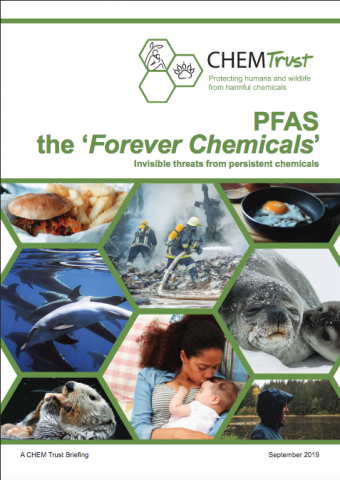PFAS – the ‘Forever Chemicals’, invisible threats from persistent chemicals

Urgent action needed on highly persistent PFAS chemicals
A new CHEM Trust briefing highlights the threats posed to the environment and human health by a family of over 4,000 highly persistent chemicals: PFAS (Per- and polyfluorinated alkyl substances), also known as the ‘forever chemicals’.
CHEM Trust is extremely concerned that, because of their high persistence, this group of chemicals could lead to a situation where their adverse effects could last for generations if urgent action, such as a global ban, is not taken.
This briefing summarises the current scientific knowledge on this chemical group and the evidence behind these concerns (including the knowledge gaps). We also recommend actions that must be taken to better protect people and wildlife from these chemicals.
Everywhere Chemicals
People and wildlife are exposed to hundreds of PFAS simultaneously from various environmental routes, including drinking water, and via consumer products (e.g. waterproof coats, non-stick pans, greaseproof food packaging, cosmetics etc.).
Some have proven toxicity (e.g. thyroid disease, reduced response to routine vaccination in children, possibly carcinogenic), and many haven’t yet been properly studied, but they may well turn out to be harmful to human health when the analysis is done. Forever Chemicals
The special carbon-fluorine structure of PFAS is extremely hard to break down in the natural environment. This bond means that they are the most persistent synthetic chemicals to date. PFAS are also extremely mobile in the environment; they are already building up in the most remote areas and pose a threat to drinking water quality.
The clean-up of local contamination by PFAS is extremely challenging, while it is impossible to remove contamination from the ocean and wildlife and people around the world. Because of their extreme persistence, contamination will last decades or centuries, even after emissions have ended, exposing future generations and wildlife in every corner of the globe.
Regulation is too slow
Only two PFAS groups are globally regulated under the Stockholm Convention (PFOS in 2009 and PFOA in 2019) and industry keep replacing one regulated PFAS with a non-regulated one. If we continue to regulate them at the current rate – one PFAS every 10 years – it will take over 40,000 years to regulate all of the 4,000 PFAS.
Urgent action needed
Not acting on highly persistent and harmful chemicals has an economic cost to society. The cost of inaction on PFAS has recently been estimated at €52 – €84 billion annuallyfor health-related costs for all countries of the European Economic Area and at €46 million – €11 billion annually for environment-related costs for the European Nordic countries.
It is unknown what consequences will arise from the global exposure of people and wildlife to increasing levels of PFAS. However lessons learnt from the past, such as with PCBs and DDT, tell us not to wait decades to see what happens, but to urgently stop emissions of these highly persistent chemicals that may well undermine the health of both humans and wildlife.
Dr Julie Schneider, CHEM Trust campaigner and author of the new briefing, said,
“What we are witnessing with the PFAS chemicals is another example of the failure of the current regulatory framework to adequately protect people and wildlife from the potential harm caused by some synthetic chemicals.”
“We need to adopt the grouping approach in regulating chemicals, we can’t wait millennium to have all the PFAS banned one by one.”
“We also need a new regulatory framework that is more preventive towards highly persistent chemicals. The system should be designed to make the build-up of man-made chemicals in the environment impossible. This is the best way to protect future generations and wildlife from unforeseen adverse effects triggered by the accumulation of synthetic chemicals in the environment.”
Recommendations
It’s time that governments around the world move to phase out these chemicals, while companies should stop using them and move to safer, non-fluorinated alternatives. CHEM Trust proposes the following actions are taken to address these ‘forever chemicals’:
Government actions
- The UK and other governments must act faster to phase out all PFAS, in collaboration with the EU and through global agreements.
- The UK and other governments must ensure that the environment is monitored for a wide range of PFAS chemicals.
- Governments should work towards new, protective regulation of all highly persistent man-made chemicals.
Industry responsibility
- Companies should immediately work to phase out PFAS chemicals, replacing them with safer, non-PFAS alternatives.
Individual action
- When shopping, ask for and choose PFAS-free products, for example fluorine-free waterproof goods and cosmetics.
CHEM Trust is a signatory to the “Zürich Statement on Future Actions on Per- and Polyfluoroalkyl Substances (PFASs)” (2018).
